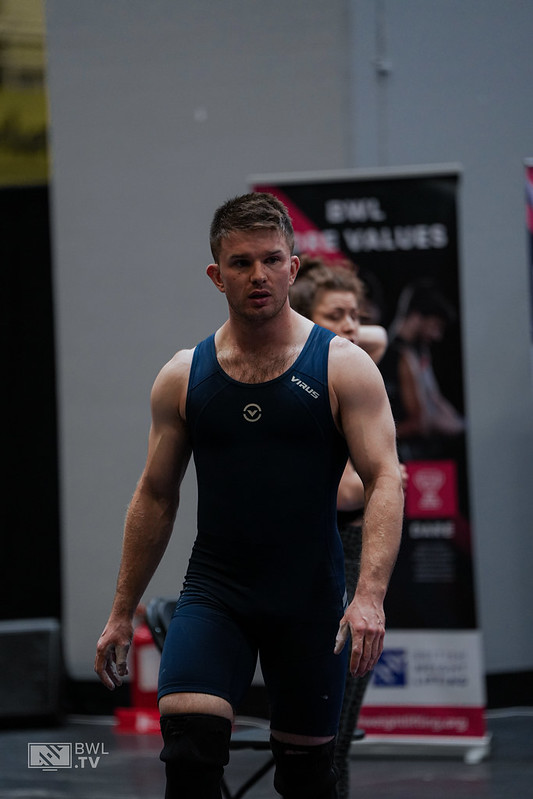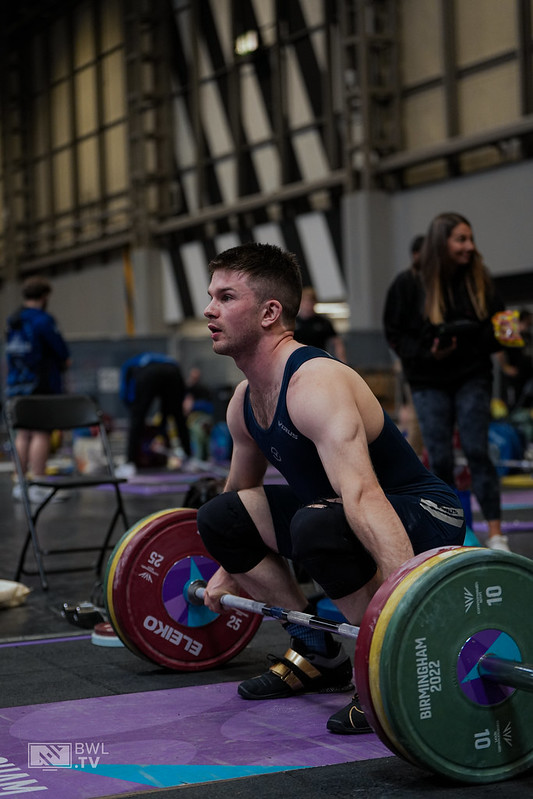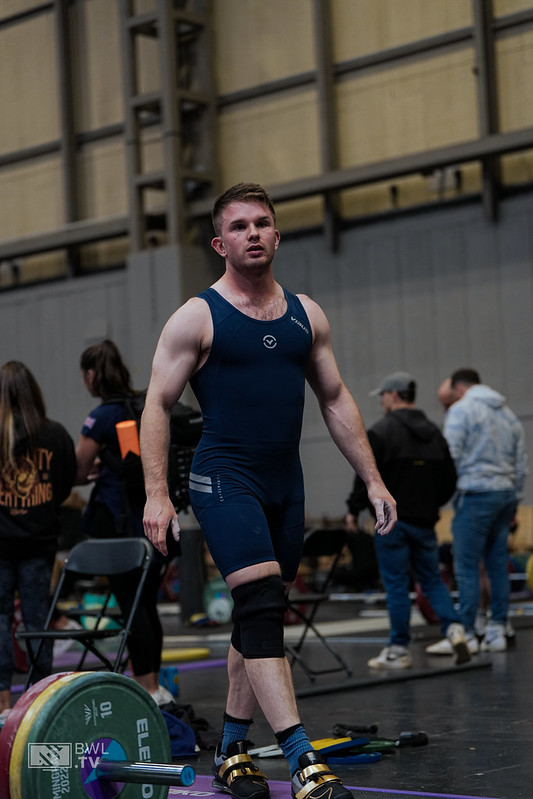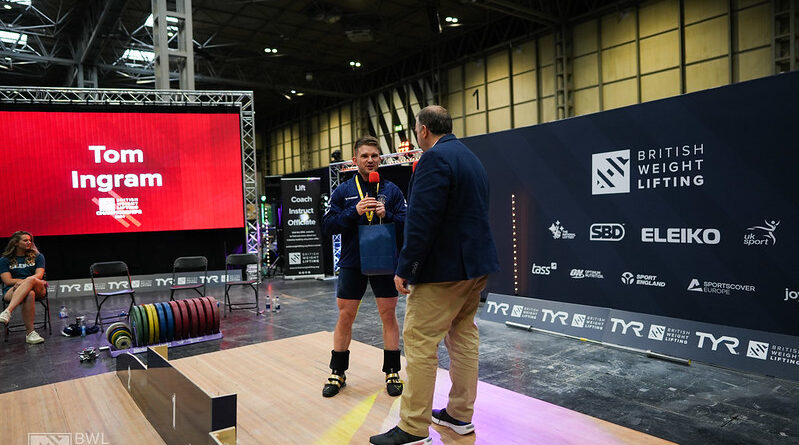YSJ’s British Weightlifting Champion on studying whilst working and career choices
In this blog, YSJ’s British Weightlifting Champion talks about studying whilst working and career choices. Tom has just won Gold at the British Weightlifting Championships. He is studying for his Physiotherapy (Pre-Registration) MSc at York St John University and works part-time in Cardiff as a Physiotherapist Technician. Tom studies at York St John during term time and returns to Cardiff for work and to be with his partner during the holidays.
Tom had no idea what he wanted to do for a career on leaving his A-levels. Through his passion for sport, he discovered what physiotherapy looks like in the real world. He was recommended the postgraduate physiotherapy course at York St John. He’s excited about where his career will lead once he’s qualified.
Tom shares his journey from leaving school to studying as a postgraduate here in York. He talks about making decisions for university and how his love for sport helped him take time and perspective to make career choices he is excited about.



Studying whilst working as a post-grad student
During the holidays I work as a Physiotherapist Technician in Cardiff at the University Hospital Wales. I keep working and studying separate. With my sporting commitments I try to keep my overall priorities towards studying and training. With my student loan and NHS Student Bursary combined I’ve managed to not work during term time and then save money during the holiday periods. It’s a tricky balance.
Placement experience
I have just finished the first six months of a two year pre-registration Masters. I’ve completed my practical exams and come the autumn I’ll be doing my placement. It will be in a clinic setting, working alongside other physiotherapists.
I was in Japan and knew I needed to change my undergraduate course
I left A’levels with a place at Swansea University initially to do Mechanical Engineering. My lack of interest meant I wasn’t particularly motivated to perform in my A’levels. I went traveling and was doing Judo in Europe. Through Judo I ended up in Japan. Judo is the national sport in Japan and I trained with the national team over there. I happened upon it quite luckily through meeting people. I gained perspective during this time. I realised I wasn’t interested in the theoretical side of things. I really enjoy working with athletes and people. I was incredibly inspired by the people I met whilst travelling. I came home and changed my course from Mechanical Engineering to Mathematics and Sports Science. I rang the university and changed my course.
Working as a physiotherapist technician changed my perspective
I went to Swansea and completed my undergraduate degree. After that I thought that I wanted to do something sport related and so I set my sights on a Masters in Clinical Biomechanics. I knew that I wanted to take a little bit of a break after my undergrad as I wanted to gain some experience in the area. I thought that working in a physiotherapy department would be helpful. I used the NHS jobs website to find a physiotherapy technician post. The job was advertised as ‘helping out physiotherapists in an in-patient setting’ and performing treatment interventions. I didn’t know what the patient group was going to be at the time of applying. It turned out that I was working with a lot of older people, on a medicine ward, so they were aged 80 years plus. They had various ailments and complex social situations. It opened my eyes to what physiotherapy is. In my first three weeks I was very inspired. It changed my perspective on what I wanted to do. I worked in that department for two years. A year and a half into working I did my interview at York St John and got my place on the course I’m studying now.
Discovering what I wanted to do
I found out about YSJ through a senior physiotherapist who had been a senior lecturer at YSJ. He worked in my team at Cardiff and he told me about the course. I think part of why I’ve taken my time to work out what I wanted to do is because at school we’re still programmed towards traditional careers. All I was exposed to in terms of options were if you’re academically strong you could be a lawyer or a doctor. If you like maths then you can go into engineering. I think my sporting interests, I started Judo when I was 5 and then ended up switching to weight lifting when I was 20, that’s always been a motivating factor for me. Sport has always been something I’ve chosen to. I think that inspired me to think, “I’m only going to do something if I’m passionate about it.” I’ve always been passionate about my sport and choosing to do sport. I used that sense of self to help choose where to take my career. I’ve seen some of my friends go into their degrees and then drop out. I’m glad I’ve been able to take stock and adjust as I’ve experienced more outside of the academic sphere.
Speaking to others and working in a hospital opened my eyes
I had had no experience of what an in-patient physiotherapist is. In secondary school, I’d had no exposure to it whatsoever. Being an athlete I’d had experience of sports physiotherapy, but as a young boy, if you had no serious injuries that needed fixing all sports physio to you is going in and getting a massage. That’s exactly not what sports physiotherapy is. I had no interest in massaging people on a bed for the rest of my life. Going into hospital opened my eyes as to what the job is. I’ve found when speaking to other physiotherapists they all tended to have life experience that had led them to be in contact with an in-patient physiotherapist. They either had family members or someone who had suffered an event, or a cognitive function or a life changing injury. They had all worked with physiotherapists which the schooling system doesn’t provide. I find that interesting as it’s quite a common theme amongst physiotherapists.
Managing a passion for sports and studying
I think first and foremost I try to keep my sport and work separate. My sport serves as a reward that I can access from the work that I put in. I was doing sport when I was working full time and doing it to the same sort of frequency. Sport isn’t something that I’m entitled to. It’s always something I’ve done alongside everything else. I do my studies and work very hard to ensure that I’m on the right path so that I can continue being an athlete. Through my undergraduate studies I was finding it quite hard to structure it and so I would spend a lot of my time at the gym and not much time studying. Now when I’m at university, I tend to block out the middle section of my day. From when lectures start or when I get to the library at 9am, I will spend those middle hours of the day, perhaps up until 3pm on my studies. My sport is my evening activity which I spend about 2 hours on in my local gym at York, Dominus Crossfit. I put my studies as my priority as realistically the end goal is to be qualified as a physiotherapist. I want to be able to fund my life which then allows me to do my sport.
Vocational experience has helped me visualise the end goal
I think doing my undergrad degree I didn’t have a sense of where it was leading. I wasn’t incredibly motivated to engage with those studies. The physiotherapy course is a vocational course and I’m more passionate about it for that reason. Having had experience outside of university I have the ability to visualise what the end goal is going to look like and what my career is going to be.
My undergraduate degree opened the door to what I wanted to do
The pre-registration course requires a degree in a relevant area. Anything health science related, sports science, sports rehab, strength and conditioning. I know people that have got onto courses with pharmacology as well as bio-medical science although that’s less common. My undergrad was maths with sports science. I was quite fortunate in that had I wanted to go on and specialise in something like accountancy I could’ve done that as well. It was quite open ended in hindsight. Finding your passion and being honest with yourself is the most important thing to prioritise.
Visiting universities and deciding where to go
We’d been to various open days and to be honest the University of Swansea campus was excellent, really nice. The Bay Campus was brand new at that point and on the beach. I also went to see Birmingham and Edinburgh, those were my options. Following my A’level grades I only got accepted into Swansea. I was brought up in South Devon which is also why Swansea was a good fit because it was close to home. I currently live in Cardiff with my partner and for work.
What I like about York and York St John
I like York. I think it’s interesting how cities serve you when you’re a student in comparison to when you’re an adult working. When I came up to the interview I really enjoyed the campus structure and I really liked the city. It’s very beautiful and I liked that’s it’s relatively small as I’m not a big city person. It’s very quaint and around the centre and train station, it’s historical and pretty. There are nice things to look at and everything’s close by. You can get to things easily. The campus sold it to me and the small cohort. The waiting list for the course was quite long. There are 1,000 hours of work placement which I think contributes to the size of the cohort.
Support for sport and scholarships
When I was looking at masters in the UK one of the questions I had for the universities was around sporting support and any scholarships that might be available. I spoke with Grace Fields at York St John when I was on my open day. I mentioned my competition results and asked if there was any support. At the time there wasn’t anything but since arriving at the university, the sports team has supported me with entry to competition, travel to competition and supported with kit.
Life as a student:
My favourite spot on campus: The kitchen
The tech can’t live without: My laptop for writing research papers
What would you recommend every student do: Take up a sport, go and try every single coffee shop and take time for yourself!
Any advice for students considering uni: Life isn’t as concrete as the school system makes it sound, everything is flexible, be open to change no matter how early or late on you are in your studies.
YSJ’s biggest selling point: The campus and welcoming feeling. It feels very personal and personable and it allows the relationship with your lecturers to feel a similar way. You feel part of a small community of people rather than a large machine.
To find out more about what’s it’s like studying at YSJ, read Amy’s blog on day in the life of a YSJ student.

